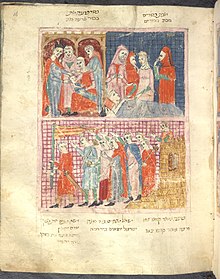
Back Plae van Egipte Afrikaans ضربات مصر Arabic ضربات مصر ARZ Diez plagues d'Exiptu AST Deu plagues d'Egipte Catalan Deset ran egyptských Czech Egyptens ti plager Danish Zehn Plagen German Δέκα πληγές Greek Dek plagoj de Egiptujo Esperanto

The Plagues of Egypt (Biblical Hebrew: מכות מצרים), in the account of the Book of Exodus, are ten disasters inflicted on biblical Egypt by the God of Israel (Yahweh) in order to convince the Pharaoh to emancipate the enslaved Israelites, each of them confronting Pharaoh and one of his Egyptian gods;[1] they serve as "signs and marvels" given by God to answer Pharaoh's taunt that he does not know Yahweh: "The Egyptians shall know that I am the LORD".[2]: 117 The Ten Plagues are recited during the Passover Seder.[3]
The consensus of modern scholars is that the Pentateuch does not give an accurate account of the origins of the Israelites, who appear instead to have formed as an entity in the central highlands of Canaan in the late second millennium BCE (around the time of the Late Bronze Age collapse) from the indigenous Canaanite culture.[4][5]: 81 [6]: 6–7
- ^ Cite error: The named reference
Greifenhagenwas invoked but never defined (see the help page). - ^ Tigay, Jeffrey H. (2004). "Exodus". In Berlin, Adele; Brettler, Marc Zvi (eds.). The Jewish Study Bible. Oxford University Press.
- ^ "08. The Meaning of the Ten Plagues – Peninei Halakha". Retrieved April 1, 2024.
- ^ Grabbe, Lester (2017). Ancient Israel: What Do We Know and How Do We Know It? Bloomsbury. ISBN 978-0-567-67043-4
- ^ Moore, Megan Bishop; Kelle, Brad E. (2011). Biblical History and Israel's Past. Eerdmans. ISBN 9780802862600.
- ^ Meyers, Carol (2005). Exodus. Cambridge University Press. ISBN 9780521002912.
© MMXXIII Rich X Search. We shall prevail. All rights reserved. Rich X Search